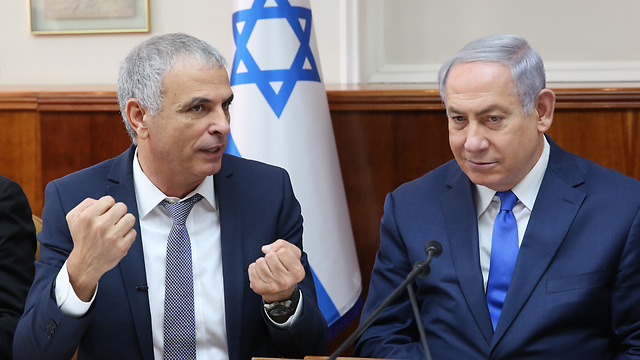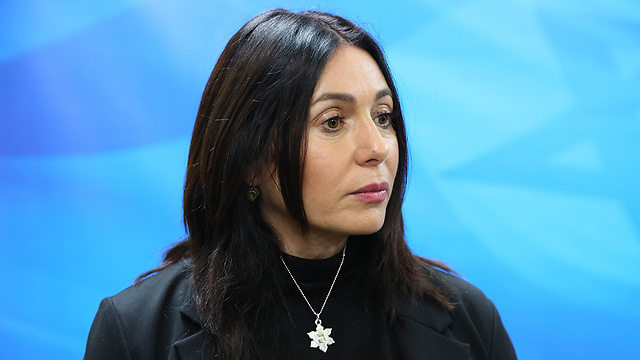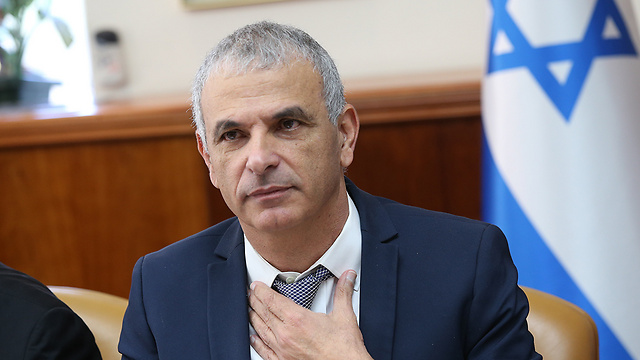
Government approves NIS 397.3 billion budget for 2019
Following all-nighter, government unanimously approved 2019 budget; Finance Minister Kahlon's Net Family plan, shortening of work week, disability benefit increases all included; heads of coalition parties agree to offset any future increases with party's budget; Kahlon: 'New distributive order.'
The government unanimously approved the 2019 state budget Friday morning, after all-night hectic debates. The budget will stand at NIS 397.3 billion and is a "social one, focused on nurturing the Israeli economy," said Finance Minister Kahlon.
"The finance minister is not a treasurer. His job is to help the economy grow and channel the fruits of that growth to the right places and to populations who have been forgotten for far too long. The budget continues the social revolution and determines a new distributive order," Kahlon asserted.
Prime Minister Benjamin Netanyahu also welcomed the budget's approval and said, "The government has approved an excellent budget and an excellent Arrangements Law expressing our consistent, responsible policy. The budget preserves the country's growth and economic strength on the one hand and looks after the social needs of all of Israel's citizens on the other."

The Defense Ministry's budget will be NIS 63 billion, the education budget will be NIS 60 billion, the health budget NIS 38 billion, whereas the welfare and Holocaust survivors' budget will be NIS 13 billion. Disability benefits were also included in the budget, to the tune of two billion shekels.
Also as part of the budget approval, heads of the coalition parties signed a document considered an appendix to their coalition agreement, which for the very first time guarantees that every time a coalition MK demands increased budgeting throughout the government's term, the increase's sum will be taken from the finance minister's financial commitment to their party.
Record budgets for Sports, Science and Agriculture Ministries
At the conclusion of prolonged negotiations, Sports and Culture Minister Miri Regev was able to come to terms with the Treasury on a one billion shekel budget for Israeli sports, the highest ever allocated, marking a 30 percent increase compared to last year's NIS 724 million budget.

Labor and Welfare Minister Haim Katz, meanwhile, agreed with the Treasury that his ministry's budget for 2019 will increase by NIS 1.236 billion, with a NIS 736 million addition for labor and a NIS 504 million addition to welfare.
The augmented budget will be used to overhaul technological colleges, professional training courses and for employment promotion, as well as to develop services and expand programs bettering the social strength of Israel's weakened populations.
One facet of the aforementioned plan to bolster Israel's needy populations is increasing nursing care benefits from NIS 3,432 to NIS 5,000, with nursing patients preferring an Israeli caregiver over a foreign one being accorded more care hours.
Katz's support of the state budget was only afforded after the Treasury acquiesced to his demand and a governmental bill to raise disability benefits will be approved in the coming cabinet meeting, linking benefits to the average wage and anchoring future incremental raises.
The Science Ministry's budget was also increased to NIS 559 million, its highest ever level and an increase of 12 percent compared to its current 2018 budget. The Agriculture Ministry also boasts an impressive NIS 1.836 billion budget, an increase over last year's NIS 1.714 billion budget.
Some of the agreements reached regarding Israel's agricultural sector: foreign workers quotas will be increased to more than 29,000 and a NIS 16 million budget will be allocated to combating agricultural terrorism.
Generally speaking, many items in the state's budget were intended to improve the lot of the country's middle class. Kahlon's Net Family plan, for instance, provides tax breaks for working families and cuts import taxes on cellular phones, baby clothes and shoes.

Despite these welcomed steps, the budget by and large missed the populations most in need. "The government once again overlooked the neediest," Executive Director of the Latet non-profit Eran Weintrob said. "A governmental goal of reducing poverty is sorely missing from the budget."
Not all government ministries fared so well, however, chiefly among them the Foreign affairs Ministry, whose budget was not only not increased but faced severe cuts, closure of diplomatic missions abroad and massive layoffs as cost-saving measures.
The threat of such drastic measures was ameliorated by the ministry's director-general's efforts to soften the blow. Director-General Yuval Rotem indeed succeeded in this endeavor, with only seven diplomatic missions—to be chosen by Prime Minister Netanyahu according to the ministry's recommendations—to be closed, instead of the 22 missions discussed in the original plan.

In addition, the missions' closure will commence in 2019 and spread out over three years. For every mission closed, the Foreign Affairs Ministry's operations budget will increased by NIS 20 million.
Furthermore, instead of downsizing 140 of the ministry's jobs, it was agreed it will encourage the early retirement of some employees.
Amir Alon, Shahar Hay, Billie Frenkel, Michal Margalit, Ilana Curiel, Rotem Elizera, Moran Azulay and Yoav Zitun contributed to this report.











